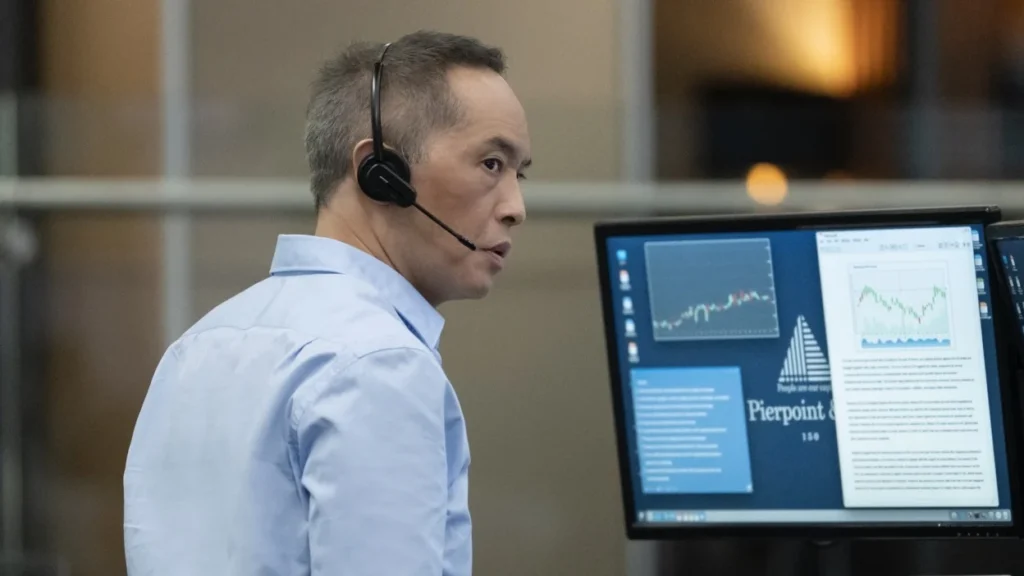HBO’s ‘Industry’ Is Not the Successor to ‘Succession,’ But It’s Becoming Something Better
The show’s third season showed the show evolve from a send-up of the City of London to deeply nuanced portraits of its characters.

Describing the HBO series “Industry”, whose third season concluded Sunday night, can be a very hard task. Since its debut in 2020, the series, created by the British writing duo of Mickey Down and Konrad Kay, has evolved beyond its simple premise that centers on a group of young graduates at the London office of Pierpoint, a fictional American investment bank. Vanity Fair has described it as “the missing link between ‘Euphoria’ and ‘Succession’”. The Independent called it “millennial ‘Mad Men’”; Vulture labeled it as Michael Mann directing ‘Gossip Girl’; Vox has called it a soap opera, while others say that it reminds them of the raunchy British teen series “Skins”. Looking through all its episodes, I would argue that it is something better.
“Industry” is seen in the shadows of “Succession”, so much so that it inherited its Sunday primetime slot at 9pm, left vacant by the megahits “House of the Dragon” and “The Last of Us.” (the show’s final two episodes were moved to different time slot to make way for “The Penguin”, after Warner Brothers Discovery decided to promote “The Penguin” from lowly Max to HBO). Perhaps “Industry” only (briefly) won that golden 9pm time slot because production moved forward, in England, while Hollywood was shut down by the actors’ and writers’ strikes. But with a slightly higher budget for its third season, as well as a guest appearance from Kit Harrington of “Game of Thrones”, “Industry” had much to offer fans looking for their HBO fix.

HBO may have been onto something, since ratings for “Industry” grew as the season progressed, which is unusual for the third season of a low budget, indy-style show. The show already had a cult audience from its first two seasons; now it’s reached a much larger base, and has evolved from a low-fi successor to “Succession” to something very fresh, and very different.
The appeal of “Industry” derives from the fact that three of its main characters are underdogs: there is Harper Stern (Myha’la of “Bodies Bodies Bodies”), an American college dropout who escaped her awful life in New York to become a ruthless trader who comes under the tutelage of Eric Tao (Ken Leung of Lost”), an American managing director in London; Yasmin Kara-Hanami (Marisa Abela of “Back to Black”), a British heiress whose lifestyle is subsidized by her father; and Robert Spearing (Harry Lawtey, who will appear as Harvey Dent in “Joker: Folie à Deux”), a working class boy fresh out of Oxford who gets lost in Pierpoint’s culture. By day, they are striving kids trying to hold the attention of interested clients and by night, they revel in sex and drugs. The tension every 24 hours between these parallel lives is quite high, forming the crux of the storytelling.

The third season is more ambitious in its storytelling, as it drills down on exploring the identity of Harper, Yasmin and Robert. In prior seasons, all three were focused on surviving Pierpont’s ruthless culture. As Harper shed some of the remains of her unhappy past working there, she became ruthless and calculating, often on the edge of destroying Pierpoint’s reputation through risky investments. Yasmin grappled with her abusive father, who kept her in golden handcuffs while continuing to indulge in bad behavior. And Rob learned that the longer he was employed, the more he was going to be used for terrible means by predatory clients and colleagues.
In Season 3, Yasmin, Harper and Robert are stronger and more assured. The cast demonstrates great capacity to communicate complex human behavior that doesn’t seem to devolve into caricatures– something that’s especially true with its supporting characters. One example is the show’s star supporting player, Mr. Leung, always a show-stealer, who’s dynamite as Pierpoint’s managing director, Eric. In one scene, he can be fearless, cold and demanding and in another, Eric can bare his vulnerabilities, deeply introspective about his role at Pierpoint. The same goes for Mr. Harrington as the smug Sir Henry Muck, a patrician con artist who runs the failing environmental startup, Lumi, for which Pierpoint is managing an ill-timed initial public offering as part of its cynical commitment to ESG (“Environmental, Social and Governence”). His meaty performance shows how an entitled, spoiled product of hereditary privilege crumbles under pressure when his house of cards collapses. Then there’s Pierpoint’s foul-mouthed market maker Rishi, played with ferocity by Sagar Radia, who is the show’s moral compass (in that he has no moral compass).

The cutthroat nature of Pierpoint is made plain from the first episode of Season 1, when a trainee competing for a permanent job dies in the bathroom from exhaustion and stress, establishing how roughshod backdrop of “Industry” has real life parallels (Wall Street and the City are both now grappling with deaths from suicide and exhaustion of their junior employees). Messrs. Down and Kay both worked in an investment bank before going into showbiz and have applied their experiences to portray a vision of broken Britain, ruled by highborn financial elites who are, fundamentally, deeply unhappy. Throughout the series, we see how Pierpont’s embrace of ESG and DEI (“Diversity, Equity and Inclusion”) is a cynical mask for their ugly ambitions.
As with most Hollywood shows about the financial markets, “Industry” is littered with incomprehensible jargon and it sometimes seems that the showrunners’ brief tenure in the City didn’t teach them enough to create a realistic portrait of London – or American – high finance. While New York-based “Succession”, also the creation of British writers from a London writing room, was meticulously researched and painstakingly accurate in its portrayal of an American media company run by a dysfunctional family, “Industry” careens from one absurd scenario to another. But you don’t have to know the financial lingo so long as you manage to get in line with the emotional beats, and “Industry” manages to get many of them right. It might not be as gripping as “Succession”, nor as popular, but it’s compelling enough to be in a class of its own.

